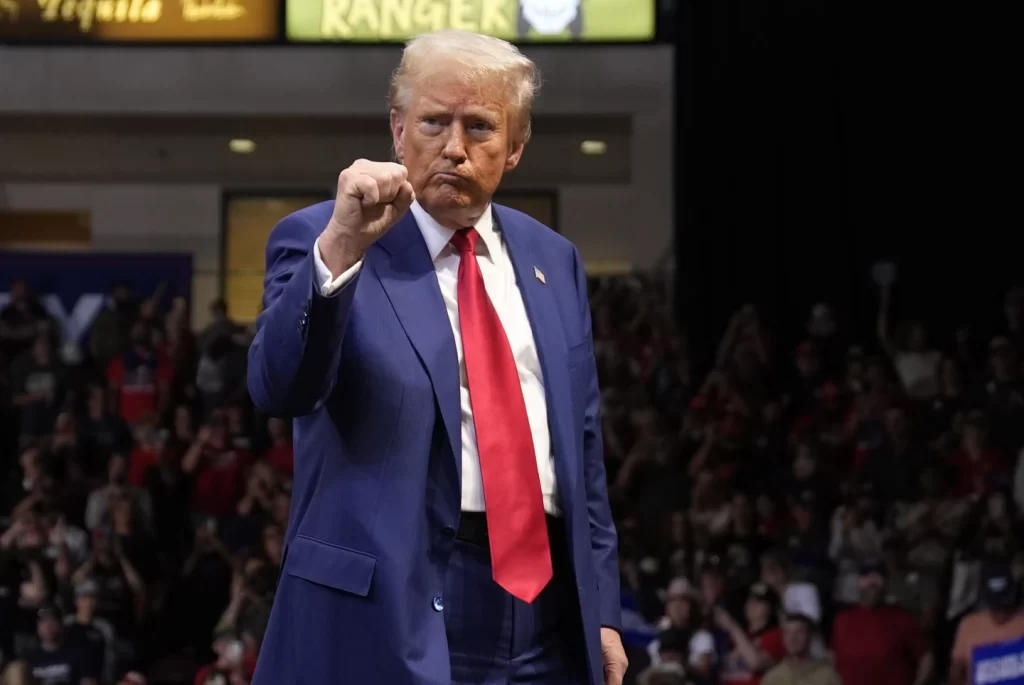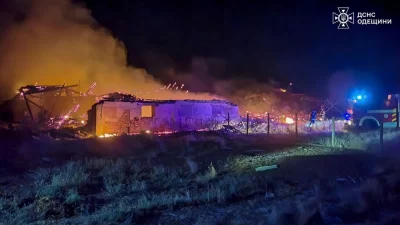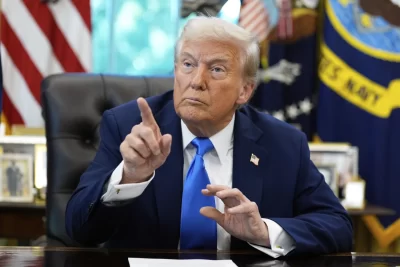
WASHINGTON — The indictment charging Donald Trump with hoarding classified documents leveled one jaw-dropping allegation after another, including that he showed off a secret Pentagon attack plan to guests at his golf club and suggested his lawyer mislead the FBI about the presence of the White House records.
But those details proved beside the point to the Trump-appointed judge presiding over the prosecution, who dismissed the case on grounds that the special counsel who brought it was unlawfully put in the job.
A separate criminal case accusing Trump of conspiring to overturn the outcome of the 2020 election seemed an opportunity for a trial this year focused on Trump’s failed effort to retain power after his loss to Democrat Joe Biden.
But the Supreme Court erased that possibility with an opinion that granted former presidents expansive immunity from prosecution.
A year that began with the prospect of a federal court reckoning for Trump will end without any chance of a trial, leaving voters without the finality of an up-or-down jury verdict in the two most consequential cases against the Republican presidential nominee. Yet both cases still loom over the election, their potential resurgence in the coming months making clear that at stake on Nov. 5 is not only the presidency but also possibly Trump’s liberty.
If Trump loses to Democrat Kamala Harris, he is at risk of trial and possible conviction in the classified documents case, assuming a federal appeals court revives it, or in the election interference case, where prosecutors issued a new indictment after the Supreme Court’s immunity opinion.
If Trump wins the White House, his attorney general could end both cases, and an already delayed sentencing in his state hush money case in New York — his only prosecution to reach a jury and end with a conviction — will be in even further flux.
That neither federal case made it to trial despite being brought well over a year ago highlights the complexities of prosecuting a former president and represents a vindication of sorts of the Trump team’s strategy of delay. It’s also a reflection of the immense hurdles prosecutors encountered before Republican-appointed judges, some of them selected by Trump, who in one case articulated a hugely expansive and novel view of presidential power and in the other appeared deeply skeptical of the prosecution’s premise well before derailing it.
“The reality is that efforts to hold the former president legally accountable (before the election), independent of the realm of politics, have failed in a wide variety of venues for a wide variety of reasons,” said Temple University law professor Craig Green.
“And what that means is it’s up to the American people” — not the courts — “what they have in mind for their future president.”
The Florida dismissal
The dismissal of the classified documents indictment was especially stunning because the case was seen inside the Justice Department and by legal experts as the most legally straightforward of the Trump prosecutions. Unlike the election interference case, it concerned behavior that occurred after Trump had left office in January 2021 and for which federal prosecutions are routine.The outcome followed nearly two years of tensions between prosecutors and Aileen Cannon, a federal judge in Fort Pierce, Florida, with scant trial experience whose relationship with special counsel Jack Smith’s team had long ago soured and whose willingness to entertain all manner of motions by Trump’s defense lawyers had snarled the case before its eventual dismissal.
An indication of just how far afield the case had strayed from core factual issues was evident during a June hearing where Cannon occupied herself with the so-called Reno Regulations, the Ethics in Government Act and an esoteric legal principle, the “de facto officer doctrine.”
By day’s end, the government’s simmering exasperation had boiled over, with prosecutor David Harbach complaining that because of Cannon’s persistent questions, he’d been able to make only one of his points.
“Mr. Harbach,” she snapped. “I don’t appreciate your tone. I think we’ve been here before, and I would expect decorum in this courtroom at all times.”
The hearing ended without a ruling.
But three weeks later, and two days after Trump survived an assassination attempt at a campaign rally in Pennsylvania, Cannon dismissed the case. Siding with Trump’s arguments, she ruled that Smith had been appointed illegally by Attorney General Merrick Garland and should have been subject to confirmation by the Senate. Smith appealed, calling Cannon’s ruling contrary to decades of precedent.
It’s unclear how long it will take for the appeal to resolve, but if Cannon’s opinion is overturned and Trump loses the election, prosecutors would be able to resurrect compelling evidence accrued during the investigation.
That includes an audio recording of Trump boasting of a sensitive document he said he knew was classified and security camera footage showing boxes of records being moved from a storage room at Mar-a-Lago, his Florida home, days before investigators came to collect documents. When that June 2022 visit occurred, a Trump lawyer handed over a single folder even though boxes of files remained at the property.
That August, the FBI recovered 11 sets of classified documents during a search of Mar-a-Lago, an action that followed heated disagreements between FBI and Justice Department officials focused less on the strength of the evidence and more on whether it was the appropriate investigative step.
Trump has maintained he did nothing wrong by retaining records from his presidency.
The investigation was far along by the time Smith, a war crimes prosecutor in The Hague and a known commodity inside the Justice Department who’d been brought in more than a decade earlier to lead its public corruption section, was appointed by Garland in November 2022.
Once on the job, Smith took steps to press the case toward indictment — his team successfully argued before a federal appeals court to secure grand jury testimony from a lead Trump lawyer, M. Evan Corcoran, whose cooperation Trump had sought to block by invoking attorney-client privilege.
Though Trump’s legal peril had long been clear, one late surprise surfaced when prosecutors began presenting evidence to a grand jury in Florida — rather than the one in Washington they had been using — to obtain the indictment. After all, the documents were found in Florida and indicting the case there would avert a court fight over proper venue.
The decision carried significant risk.
Before the indictment was unsealed, word came that the case had been assigned — randomly, the court clerk said — to Cannon.
It was an unwelcome development for a Justice Department that had tangled with her a year earlier when she ruled in favor of Trump’s request for an independent arbiter to review the records seized by the FBI. That order was overturned by a unanimous federal appeals panel after prosecutors vigorously objected.
The fraught dynamic resumed where it had left off as prosecutors’ desire for a trial collided with Cannon’s deliberative, often quixotic, style that permitted drawn-out disputes on seemingly peripheral motions and produced flashes of exasperation.
When Cannon initially permitted the defense to file a motion that would include names of government witnesses, prosecutors implored her to reconsider, citing what they said were security risks. When she asked the two sides to formulate jury instructions, prosecutors complained that she had articulated a “fundamentally flawed” premise of the case.
Under her watch, long-shot defense requests lingered for months, causing delays that led her to indefinitely postpone the trial date. She held a hearing on Trump’s legally questionable claim that he was permitted under the Presidential Records Act to take the files to Mar-a-Lago, and agreed before dismissing the case to revisit a different judge’s order that gave prosecutors access to Corcoran, Trump’s lawyer.
Smith’s team had hoped for a trial that could have started last spring. Instead, prosecutors found themselves before Cannon for a multiday hearing in June over Smith’s appointment, where Harbach lamented that defense lawyers had been permitted to “hijack” the proceedings with what he said were frivolous arguments.
Days later, Trump’s lawyers got an unexpected lift from the Supreme Court immunity ruling, which included a concurring opinion from Justice Clarence Thomas backing their position that Smith’s appointment was illegal.
Just like that, an argument that to many legal experts seemed dubious had an endorsement from a member of the nation’s highest court.
Even as frustrations mounted, department officials never sought Cannon’s removal from the case, a low-probability request that likely would have exacerbated relations had it failed. They did not do so even when they told the Atlanta-based 11th U.S. Circuit Court of Appeals in August that her order dismissing the case relied on a “nonsensical” analysis.
The appeal is pending before that court, which has the option to reassign the case if it reverses Cannon’s ruling.





